The FARI Conference returns on 17 and 18 November in Brussels, find out more.
An Initiative of
Supported by

AI, a Public Good?
Author
Laura Jousset, Carl Morch, Sezen Avci
The FARI Brussels Conference 2024, held on November 18-19, marked the third edition of this event focused on Artificial Intelligence (AI), data, and robotics for the common good. The conference, organized by FARI at Studio Flagey (November 18) and BeCentral (November 19), brought together a diverse group of participants, with researchers, policymakers, entrepreneurs, and citizens, to discuss the topic “AI, a Public Good?”.
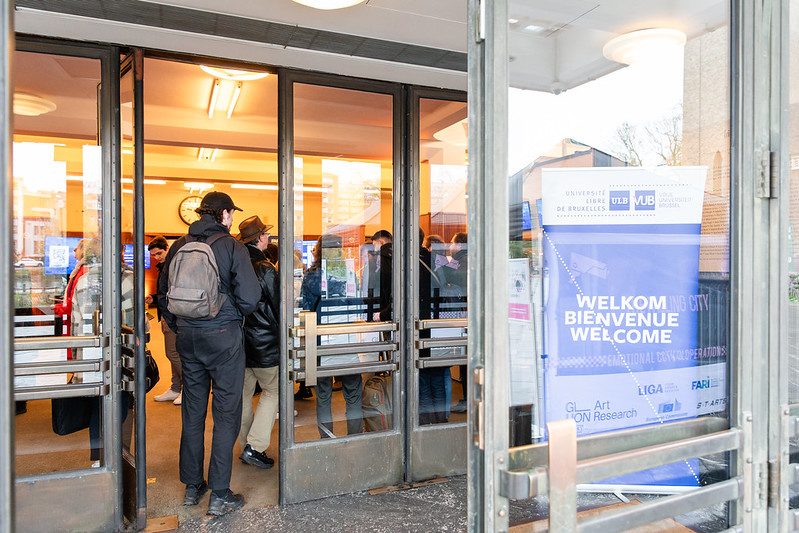
With advancements in AI, Data, and Robotics, questions about their ethical and societal impacts are growing. The FARI Brussels Conference aimed to provide a platform for critical inquiry for participants to engage in dialogue and collaboration. Are these technologies developing in a socially acceptable and sustainable direction? How do we make sure AI helps everyone, and not just a few? Is there such a thing as AI, Data and Robotics for Public Good?
Over 800 attendees joined this two-day event! They got to address these pressing questions, highlighting the growing urgency of this topic. The conference featured over 40 speakers, with exemplary gender parity both on stage and in the audience. It shows the need for collaboration, ethical governance, and interdisciplinary approaches to ensure AI serves society at large.
November 18 – Conference Day at Studio Flagey
The FARI Brussels Conference on November 18 was a day full of panel discussions and keynotes, centered around the theme of AI as a public good. Experts from various fields shared their perspectives on how AI can serve society, highlighting both the opportunities it presents and the challenges it poses.
The day kicked off with opening remarks from high-level representatives, including the European Commission, the rectors of VUB and ULB, and the ambassadors of France and Germany in Belgium. These leaders emphasized the importance of collaboration and innovation in shaping Europe’s technological future, setting the stage for the day’s discussions.
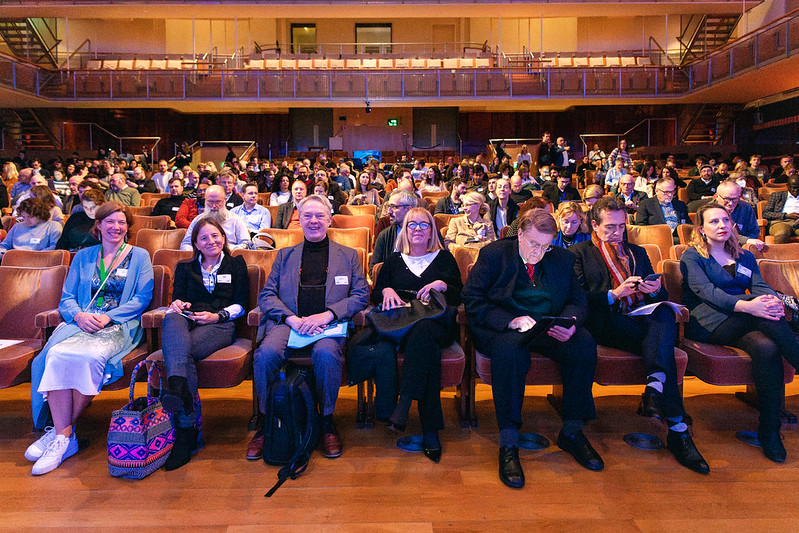 © Thierry Geenen / FARI – AI for the Common Good Institute
© Thierry Geenen / FARI – AI for the Common Good Institute
The day featured a total of 6 parallel sessions — 3 in the morning and 3 in the afternoon — along with 3 engaging keynote speeches, each addressing the topic from different angles and perspectives.
As the conference ended, Karen Boers, Director of FARI, delivered a powerful speech, reflecting on the institute’s achievements and the significance of the day. A special moment came when the first cohort of FARI’s postgraduate program received their degrees, marking a milestone in the institute’s dedication to AI education. The Dutch Ambassador also shared words of support, reinforcing the growing international recognition of FARI’s contributions to AI research and development.
Beyond the discussions and speeches, the conference offered a rich variety of interactive experiences. Our Test and Experience Center relocated its live demos for a day, giving attendees the opportunity to explore innovative technologies firsthand and deeper insights into their practical applications. Additionally, in collaboration with local artists, we created an art room that offered a space where art and AI intersected. Finally, booths from our partners provided further opportunities to explore the latest innovations or services in Brussels, with partners ready to answer questions and engage in conversations.
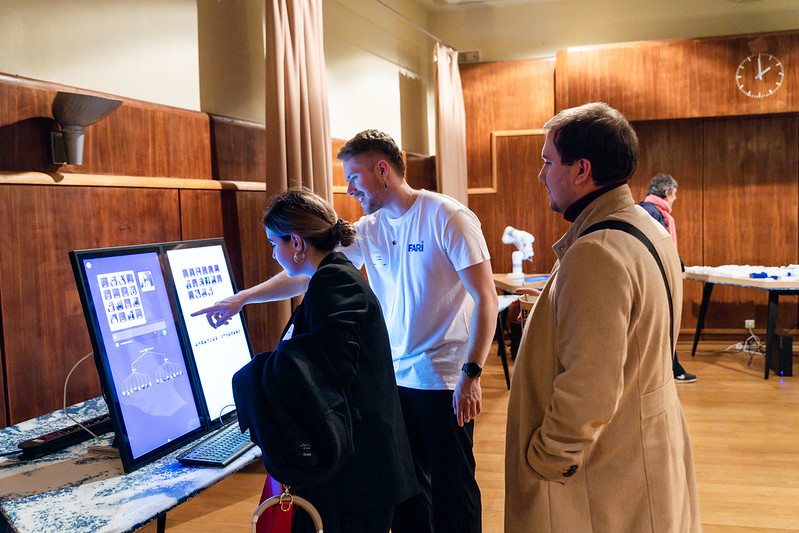
Keynote Speeches: Visionary Perspectives
The conference began with inspiring keynote speeches from Mireille Hildebrandt, Professor Emerita at Vrije Universiteit and Radboud University, and Theresa Zueger, Head of the German Public Interest AI Research Group.
Prof. Mireille Hildebrandt called for a more thoughtful, deliberate approach to AI innovation. She posed three critical questions for AI research: What problems can AI solve? What can it not solve? And what new challenges might it create? Hildebrandt stressed the importance of integrating law, democracy, and justice into AI development, urging that AI systems prioritize public welfare over private sector interests. She also critiqued the push to match U.S. tech innovation, advocating instead for a European approach focused on creating reliable, problem-solving AI that does not introduce new risks. In some cases, she argued, it may be wise not to deploy certain technologies at all.
In her keynote speech, Theresa Zueger highlighted the importance of clear, precise language, particularly in defining terms like “public interest,” to ensure that AI projects align with ethical and societal values. She outlined five key criteria for responsible AI: accountability, equity, participation, validation, and sustainability. Zueger emphasized that collaboration, inclusive governance, transparency, and trust are essential to ensure AI serves the public good.
The conference day concluded with a keynote from Yoshua Bengio, a pioneer in deep learning. Bengio discussed the responsible development of AI technologies, emphasizing the need for transparency, fairness, and accountability in AI systems. He also explored AI’s transformative potential in addressing global challenges such as climate change and inequality. His message resonated with the overarching theme of the conference: AI must be harnessed as a tool for the common good.
Key takeaways from the Panel Discussions
The panel discussions at the FARI Conference 2024 addressed the transformative potential and challenges of AI, data, and robotics in both public service and societal contexts.
Ethical AI in Public Services
The session on “Assessing AI, Data, and Robotics in Public Service Missions” reminded the necessity of transparency and accountability in the use of AI and data in public services. Speakers discussed the opportunities AI presents for improving efficiency and service delivery yet also highlighted the ethical concerns surrounding its implementation. Public trust is key, and the conversation stressed the need for a framework that prioritizes fairness, addresses biases, and ensures AI technologies align with societal values. Ethical considerations, including public awareness and involvement, must guide the integration of these technologies in governance.
Turning Private Innovation into Public Benefit
In the discussion on “From Private Innovation to Public Benefit,” the panelists focused on the challenges of translating innovations from the private sector into public benefit. AI’s role in optimizing urban mobility and climate action was explored, with a particular focus on using data and technology to address sustainability, safety, and congestion in cities. Similarly, robotics was highlighted for its potential to enhance public services. However, the conversation also pointed out the difficulties in achieving public acceptance and the need for effective communication strategies when deploying innovative technologies in the public sector.

Opening Access to AI and Data Research
The session on making AI and data research more open and accessible stressed the importance of overcoming infrastructure and data management barriers, particularly in under-resourced regions. An important theme was the need for equitable access to AI research and technology, ensuring that all sectors, especially healthcare and education, can benefit from advancements. Speakers discussed the balance between openness in research and the protection of sensitive data, urging the creation of networks and partnerships that foster inclusivity in AI development. This approach aims to mitigate research biases and enhance the broader societal impact of AI innovations.
Regulating AI for the Common Good in Europe
The conversation around AI regulation in Europe highlighted the need for legal frameworks that balance fostering innovation with protecting ethical standards. The panelists pointed to the global competition in AI, with particular attention to Europe’s position in the global technological landscape. They emphasized the importance of developing a European AI infrastructure that supports sovereignty and avoids dependency on non-European providers. The EU’s AI regulations must ensure that technologies are human-centered, trustworthy, and aligned with European values, while preparing for future challenges like quantum computing.
Collaboration for Ethical AI Governance
Collaboration across sectors was a central theme in the “Working Together” session. Experts discussed the importance of cooperation among citizens, companies, governments, and researchers to ensure AI development is ethical, inclusive, and transparent. Public participation throughout the AI lifecycle, as well as reclaiming data control, were highlighted as key solutions to address the concentration of power in the tech sector. By fostering meaningful engagement and incorporating diverse perspectives, the panelists argued that AI systems could be developed in a way that benefits all of society, not just a select few.
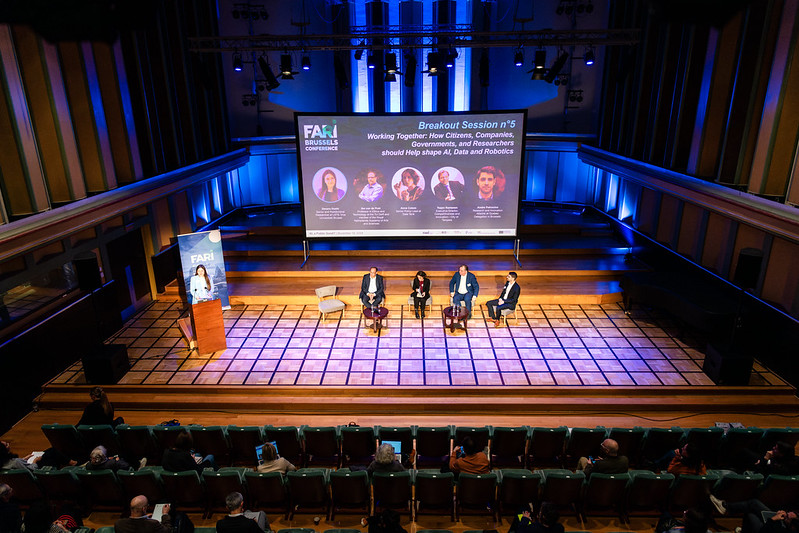
AI in the Arts and Society
The “Creative Futures” session explored the role of AI, data, and robotics in culture, arts, and society, demonstrating how these technologies can augment creativity while keeping human creators at the center. From enhancing children’s play to transforming cultural experiences through augmented reality, the panelists showcased how AI is reshaping artistic expression and cultural engagement. They emphasized that AI couldassist in generating new ideas, but it is human creators who drive and shape the artistic process. This discussion highlighted the potential for AI to collaborate with humans in crafting innovative, accessible cultural experiences.
November 19 – FARI Partners Day
The FARI Brussels Conference on November 19th featured a diverse range of partner-organized events exploring the theme “AI, a Public Good?”. The day focused on AI’s role in public policy, innovation, and citizen engagement, with contributions from European institutions, private companies, research organizations, and international stakeholders.
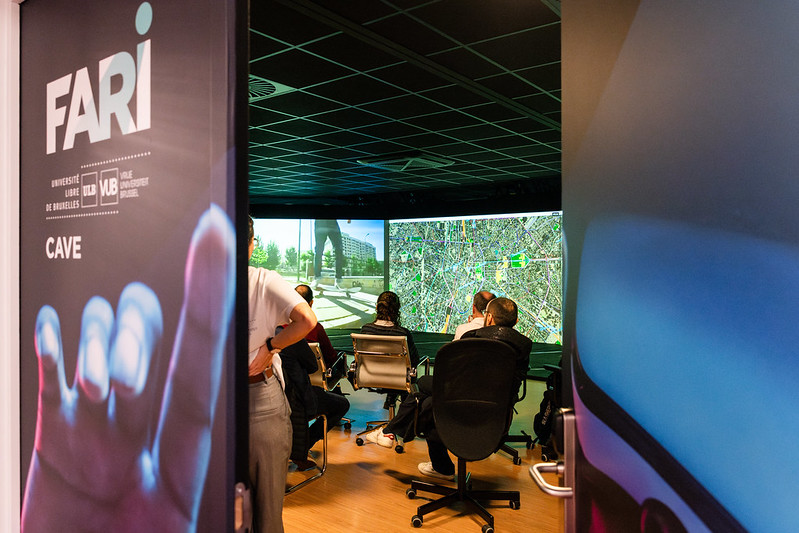
Among the key topics were the role of digital twin technologies in urban development, showcasing how cities worldwide are integrating citizens into solutions for challenges like mobility and air quality. This set the stage for later discussions on how technology can drive sustainable urban change.
Governance and innovation also took center stage, with a focus on public-private-academic partnerships in reshaping public administration. Sessions emphasized the potential of Local Digital Twins (LDTs) in accelerating the transition to Positive Energy Districts (PEDs), as well as the importance of AI education in fostering responsible innovation.
Another key area of focus was the practical implementation of AI through innovation sandboxes, where experts shared best practices to ensure AI technologies are tested safely and responsibly. Art and creativity were also explored, examining the boundaries of AI-driven innovation and its potential to transform creative industries.
Finally, the day highlighted the role of AI and data in fostering sustainable innovation, with sessions on sustainable AI, data reuse, and collaboration between SMEs and research institutions. The FARI AI Accelerator graduation showcased the potential of AI startups to drive societal change, emphasizing AI’s transformative role in shaping a future that balances technological progress with ethical considerations.
The organizing partners of this day included CitCom.ai, hub.brussels, the United Nations Office for Disarmament Affairs (UNODA), the Stockholm International Peace Research Institute (SIPRI), CAIRNE, Make.org, ifok GmbH, Gluon, the European Commission’s Big Data Test Infrastructure (BDTI), Eurocities, Open & Agile Smart Cities (OASC), VUB BUDA, SustAIn.brussels, and The Data Tank, among many others. These partners played a key role in organizing and facilitating the discussions, fostering collaboration, and advancing the conversation around AI as a public good.
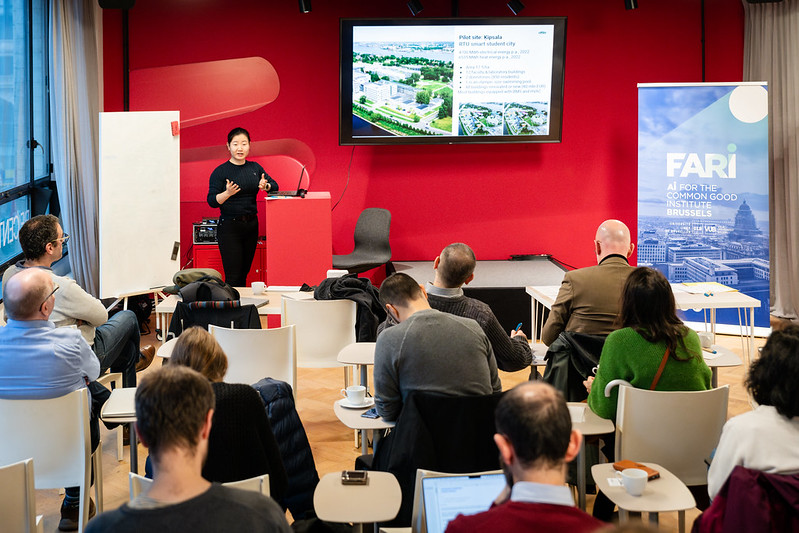
Food for thought
The sessions at the FARI Brussels Conference 2024 provided insights into the evolving role of AI across different sectors. Among the key reflections:
– AI as a Public Good: With AI’s growing influence, how can we establish policies and frameworks to ensure it serves the common good, preventing it from exacerbating inequalities or infringing on privacy?
– Ethics of AI in Society: As AI systems increasingly shape our daily lives, how can we balance rapid technological advancement with ethical considerations like fairness, dignity, and accountability?
– AI’s Role in Sustainability: How can AI-driven innovations accelerate sustainability efforts in cities, and what barriers must we overcome to ensure their successful adoption in diverse urban settings?
– AI and Human Creativity: As AI becomes more integrated into creative fields, the question arises—can AI truly replicate human creativity, or is it just a tool for human expression? This prompts a rethinking of the boundaries between human and machine-made art.
Over two days, experts, policymakers, and citizens debated one key question: Can AI truly be a public good? The insights from FARI Brussels Conference 2024 provide an important foundation for shaping a future where AI enhances well-being and tackles both local and global challenges. Moving forward, FARI is committed to driving responsible innovation, ensuring AI benefits society, and turning “AI for the Common Good?” into “AI for the Common Good!”
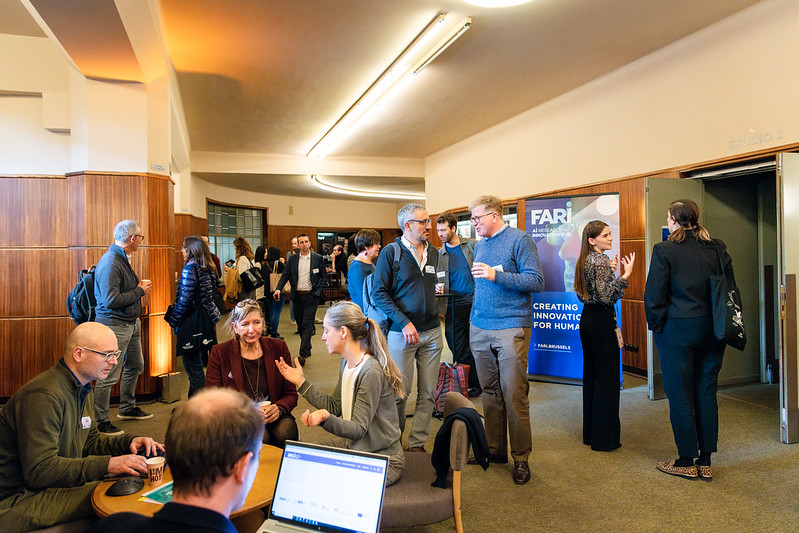
Recordings of some sessions from November 18 are available on the FARI YouTube channel. We look forward to returning in the second semester of 2025 for more discussions and advancements – stay tuned and register to our newsletter not to miss the FARI Brussels Conference 2025 announcement.
Share
Other news